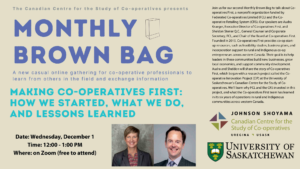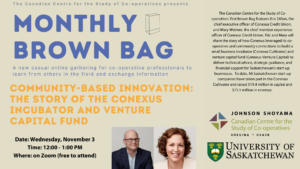
The Canadian Centre for the Study of Co-operatives’ (CCSC) Monthly Brown Bag is an online gathering for co-operative sector professionals to learn from others in the field and exchange information in a casual setting.
On December 1, 2021, the second Monthly Brown Bag featured Co-operatives First, a nonprofit organization funded by Federated Co-operatives Limited (FCL) and the Co-operative Retailing System (CRS). Our speakers were Audra Krueger, Executive Director of Co-operatives First, and Sheldon Stener Q.C., General Counsel and Corporate Secretary, FCL, and Chair of the Board at Co-operatives First. Founded in 2015, Co-operatives First provides co-op start-up resources, such as feasibility studies, business plans, and incorporation support to rural and Indigenous co-op entrepreneurs across western Canada. Their goal is to help leaders in these communities build new businesses, grow local economies, and support community development. Audra and Sheldon shared the story of Co-operatives First, which began with a research project called the Co-operative Innovation Project (CIP) at the University of Saskatchewan’s Canadian Centre for the Study of Co-operatives.
Below is the full transcript of their talk.










